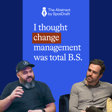
Ep 107: From Big Law to GC Before 35: Andrew Epstein’s Journey on Navigating Modern Legal Careers
In this episode of The Abstract, host Tyler Finn sits down with Andrew Epstein, General Counsel of Demandbase, for a candid conversation on building a legal career rooted in curiosity, intentionality, and creative risk-taking. From starting his career in the GC’s office of the Washington Nationals to handling high-stakes spinouts at LiveRamp, Andrew shares how he made bold choices, built trust across functions, and scaled legal teams strategically. He dives deep into building legal ops, leveraging AI thoughtfully, and what it really takes to thrive as a first-time GC. A must-listen for in-house leaders, aspiring GCs, and legal professionals navigating a rapidly evolving legal landscape.
Read detailed summary: https://www.spotdraft.com/podcast/episode-107
Topics
Introduction – 00:00
Andrew’s intentional path to law school and first job at a GC’s office – 02:28
Working for the Washington Nationals and using that experience to stand out – 04:38
Choosing O’Melveny for its cross-office structure and California links – 08:10
From Capital Markets to Privacy: Why Andrew Left Big Law for In-House at LiveRamp – 09:49
Managing complex transactions: M&A, spinout from Axiom, NYSE listing – 17:18
Privacy, Adtech, and Proving Your Value in a Changing Legal Team – 22:04
Getting hired as GC at Demandbase through cross-functional trust – 27:33
Scaling the legal team intentionally for IPO readiness – 29:41
Growing as a first-time GC through peer mentorship – 32:43
Building a lean, flexible team that integrates AI and legal ops – 35:35
Encouraging AI experimentation over shiny tools – 40:08
Rapid-fire Question – 46:04
Connect with us:
Andrew Epstein - https://www.linkedin.com/in/andrew-epstein-3b22a471/
Tyler Finn - https://www.linkedin.com/in/tylerhfinn
SpotDraft - https://www.linkedin.com/company/spotdraft
SpotDraft is a leading contract lifecycle management platform that solves your end-to-end contract management issues. Visit https://www.spotdraft.com to learn more.



















